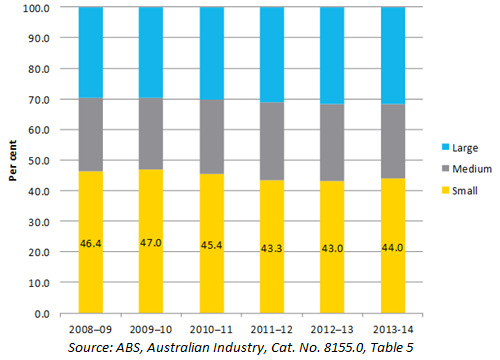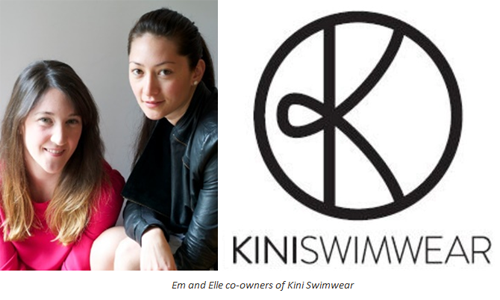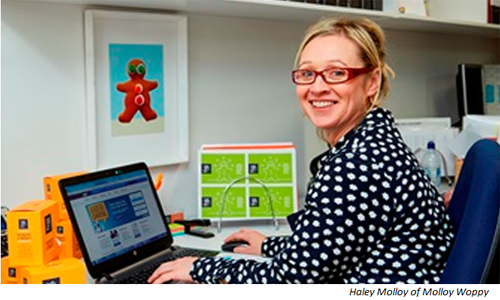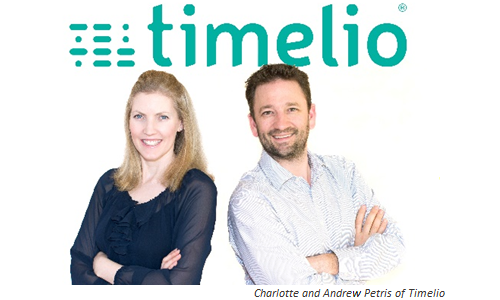-
Small businesses are vital to all economies, providing unique products and experiences for customers whether in big-city alleyways, corner stores or regional communities.
According to the Australian Bureau of Statistics, small business accounts for the largest share of total employment in Australia (by firm size) at 44.0 per cent. Medium businesses make up a further 24.3 per cent.
" Small businesses do not share the same luxuries their larger competitors do… yet many of them are more successful. What can they teach their bigger peers?"
Keren Roberts, GM - NZ Shared Services at ANZ
But they do not share the same luxuries their larger competitors take advantage of every day. Levels of staff, revenue and funding differ dramatically at small business level yet many of them are more successful. Are there lessons there for their bigger peers?
To succeed SMEs must watch every dollar, be careful with investment, focus on their customers and operate on the knowledge a single poor decision can mean the end of their business. As the Reserve Bank of Australia says, small business “tend to have a higher risk-return profile than larger businesses, reflected in revenue and profitability”.
But it’s hardly all easy going for large enterprises which are often slow to change. As noted in Fortune Magazine, “as long as bureaucracy, corporate politics, and internal rivalries are present in big firms, smaller companies will be able to exploit the resulting inefficiencies and thrive”.
With this background, a team from ANZ’s Technology, Shared Services and Operations interviewed 10 successful SMEs across Australia, China and New Zealand to understand the common themes which drive success in the microbusiness industry.
Using what we learned from working with these businesses, here are five key attributes of successful small businesses.
THE CUSTOMER FOCUS
For a small business, customers are everything. Our research showed successful small businesses know them, understand them, get out and listen to them – and never lose touch.

Kini Swimwear is a designer group which creates custom swimwear. The company regularly seeks feedback from its customers, personally speaking to them during the lifecycle of a transaction.
Kini founder Elle Aram told BlueNotes customers are the cornerstone of the business and “we treat them like they are our own girlfriends”.
Kristy Bautista is co-owner of Koto Hairwith her sister Tahleaha. For them too, the customer is the core part of their business DNA and their value proposition.
“We at Koto Hair strive to be the go-to salon for five-star service where customers leave feeling glamorous,” she says.
The commitment these SMEs have to their customers raises questions for large organisations. Can big businesses become complacent towards their customers? Are they iterating services or products or just reading industry white papers or generalised surveys which only speak in statistics?
STAFF & CULTURE
The best small businesses hire staff who fit the culture of the company and love coming to work every day. Successful businesses have cohesive teams where owners work to retain their people.
“Our company will be successful if we employ amazing, talented people,” Con Zeritis, CEO of medium sized Sydney based technology consulting and venture company IndustrieIT told BlueNotes. “Our greatest challenges are from within - making sure people are engaged and excited to be here and feel like it's a great place for their own personal growth.”
The owners of Monaco’s delicatessen in Melbourne treat their staff to a home cooked meal each night and try to build a family atmosphere.
For big business, the lesson here is ensuring hiring policies are geared towards culture and values. What is the ‘home cooked meal’ for the staff of your big business?
AGILITY
A successful small business can make decisions and implement solutions quickly in response to changing needs. Some do so via agile products, particularly in IT, while others monitor trends.
“We have a culture of working in ways that are agile, lean, creative and autonomous,” Zeritis says.


Molly Woppy is a successful New Zealand-based gourmet cookie producer run by Hayley Molloy and Alistair Parker.
“We have three market segments and focus key staff quickly” Alistair Parker told BlueNotes.
Successful startup founder Leo Chen owns Jumei, a Chinese online cosmetic shopping platform which has grown rapidly. He says the decision-making processshould not be complicated as it does not add value - only actually doing something does.
“People who own the knowledge should speak the loudest and not the one who is holding high office,” he says.
The success of startups like Jumei shows more than ever that it is critical for big businesses to work out how to cut red tape from their processes. Why are the layers of process and governance there? How can offerings be made simpler and easier to change?
CLEARLY DEFINED PURPOSE
Successful small businesses are crystal clear on both what they offer and what they don’t, as well as how that differentiates them from competitors.

Timelio is a peer-to-peer finance platform that makes it easy for businesses to access invoice finance, matching them directly with investors via an online marketplace. In the crowded financial services industry Timelio is clear about its proposition: help growing businesses access fast, flexible and lower cost finance.
“Creating a marketplace has enabled us to challenge traditional funding and distribution models and offer a much stronger value proposition to our customer,” founder and CEO of Timelio Charlotte Petris told BlueNotes.
“We can serve more customers and grow faster with a less capital intensive funding model,” Petris says.
A focus in execution is important. Koto Hair organises its business, including policies, procedures and training, around clients.
“We have a Client Journey Handbook,” Bautista says. “It is how we ensure we deliver the best possible customer experience and continually improve it.”
Often large businesses are large because they’ve acquired other businesses or branched out into other segments. It can be very easy to lose sight of the purpose of a company and what it stands for.
BALANCING CASH FLOW AND INVESTMENT
Small businesses do not have funding from thousands of shareholders, nor the ability to make mistakes and recover. Often money invested comes entirely from the business owners themselves.
However, lower costs and focused investment brings its own set of unique advantages.
“By utilising technology to offer the best user experience and reduce transaction costs, we are able to share those productivity gains with our customers,” Petris says.
It’s hard to imagine how decision-making processes at a big business would change if funds were suddenly constrained. What if it was the decision makers’ own money? Would that drive further innovation or improved agility?
NOT EASY
There are many reasons why big and small businesses differ. But with technology breaking down some of the barriers to entry to larger markets, there will inevitably be increased competition from tech-enabled SMEs.
Our research showed us areas of focus for large enterprises are being clear on purpose, focusing on customers, modifying hiring to reflect culture, breaking down bureaucracy and a focus on service.
In large organisations it’s not easy but it can be done by finding those internally already doing it well and growing from there. There is no doubt some large businesses are focusing on these attributes well, but there is always more for big businesses to learn.
Keren Roberts is GM - NZ Shared Services at ANZ. Members of the TSO team who contributed to this article include Graham Browne, Ryan Deng, Emily Edgeley, Kate Johnstone, Yangsheng Feng, and Chithra Sundar.
Banner pic: the staff of Koto Hair
The views and opinions expressed in this communication are those of the author and may not necessarily state or reflect those of ANZ.
EDITOR'S PICKS
-
Not many people can say their business took flight after their house was burgled. But that’s how ‘The Hatch’ was born, says University of Canterbury Engineering graduate and Wireless Guard CEO Taylor Howatson.
25 July 2016 -
Smaller organisations are faster and more successful at identifying the core purpose of their business compared with larger counterparts, according to one of Australia’s leading executive coaches.
25 July 2016 -
In May, a group of ANZ executives selected for their influence on the bank’s digital future travelled to the US to participate in a program jointly created with the Massachusetts Institute of Technology (MIT).
18 July 2016
